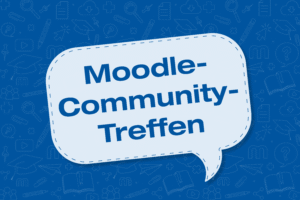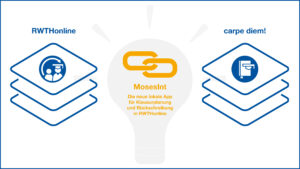Kategorie: ‘Projects & Cooperations’
Towards the Future with AI – How the IT Center Is Supporting RWTH Aachen University on Its Way into the AI Age

Source: Pixabay
Artificial intelligence (AI) is no longer a topic for the future – it has arrived in the centre of society and is changing the way we research, learn and work. As one of Europe’s leading technical universities, it is therefore crucial for RWTH Aachen University to actively engage with the potential and challenges of this technology.
As RWTH’s central IT facility, the IT Center plays a central role in this: it develops technical solutions, ensures a data protection-compliant infrastructure and creates new services that enable the use of AI in the university context.
And not just since yesterday: For some time now, the IT Center has been working intensively on making artificial intelligence usable for the entire university.
EUNIS2025 Best Paper Award: Award for the IT Center
We are pleased to announce that Bernd Decker and Denise Dittrich, from the IT Center at RWTH Aachen University, have won the EUNIS 2025 Best Paper Award. In their award-winning paper, entitled ‘Cost Management for the Use of Generative AI in Higher Education: A Case Study from North Rhine-Westphalia’, the authors highlight the key functions of cost management within KI:connect.nrw and share their experiences of using it at RWTH Aachen University.
Follow-up Report: Moodle Community Meeting 2025

Source: Own Illustration
On May 26, 2025, employees of the IT Center and the Center for Teaching and Learning Services (CLS) traveled to Bochum for the 7th edition of the Moodle Community Meeting. Organized by Moodle.nrw, the event takes place every year at the Ruhr University Bochum (RUB). It brings together universities from all over NRW for a series of presentations and workshops on the teaching and learning platforms Moodle and ILIAS. This year, 13 sessions took place, covering three main topics: the development of new features, the management of old data and the possibility of connecting ILIAS and Moodle with external platforms and tools.
RWTH, May We Introduce: git.nrw
A new service is now available to employees and students in pilot operation: git.nrw!
The associated git.nrw project was launched to provide a central platform to facilitate the exchange of code and ideas between developers, students, and teachers. The aim of the project is to provide a shared central GitLab instance for all universities in North Rhine-Westphalia to facilitate cross-institutional work.
The technical requirements have now been met to gradually open up the instance. RWTH is one of the first universities in North Rhine-Westphalia to be allowed to use the platform. Other universities will be connected step by step.
Find out what the git.nrw service can do and how you can use it for your everyday tasks in the blog post.
Green HPC: Sustainability in the Data Centers of Tomorrow
Digital technologies have become an integral part of science and industry – but data centers are among the biggest energy consumers in the IT sector. High-performance computers in particular are essential for complex calculations in research, but at the same time cause high electricity costs and CO2 emissions. To meet these challenges, RWTH Aachen University is focusing on innovative solutions for energy efficiency and sustainable resource utilisation.
Microsoft Office at RWTH: An Overview

Source: Unsplash
Progressive digitalisation and flexible adaptation to new circumstances have significantly changed everyday working life, studies and research at RWTH Aachen University since spring 2020. Without the right tools, communication and collaboration between members of RWTH would have been much more limited in times of home office and distance learning.
New Certification Authority: From Sectigo to Harica

Source: Own illustration
The time has come! Since April 1, 2025, user certificates (S/MIME) can again be requested in the RA-Portal. After our previous certificate provider, Sectigo, terminated its contract on January 10, 2025, we now have a new provider. The German Research Network (DFN) and GÉANT have contracted a new provider for public-key certificates. The choice fell on the Greek trusted provider HARICA (Hellenic Academic & Research Institutions Certification Authority). HARICA is a certification authority of the Greek university network GUnet, is specially optimized for research institutions and meets the highest security standards.
DataStorage.nrw – How Do You Find out When Your Research Data Will Be Migrated?

Source: DataStorage.nrw
Preparations for the DataStorage.nrw connection are currently in full swing. Until the wait is over, we would like to prepare you for what the migration will look like for you on the Coscine platform. This way you can see at a glance whether your research data is currently being migrated.
Upgrade for Writing Back Exams: In-House Development “MosesInt” Helps

Source: Own Illustration
Do you know how exam dates are organized at RWTH? Every semester, a large number of dates are planned centrally using the “carpe diem!” software and then transferred to RWTHonline – a process known as “exam re-registration”.
Until now, the complex merging of data from both systems has posed a particular challenge. As the software providers were not yet able to provide an automated solution for the process, the IT Center and the departments involved had to resort to manual workarounds.
Thanks to the “MosesInt” project, this is now a thing of the past! Read more about the new local app “Exam planning and write-back”, which has now been made available, in the article.








